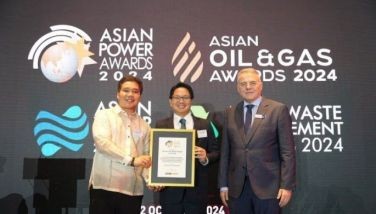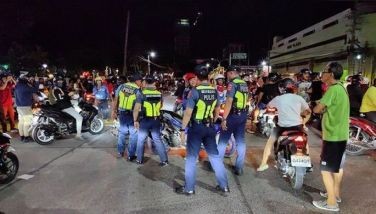Leaders for Health Program: Transforming rural folk into health leaders
December 14, 2006 | 12:00am
When a physicians’ board first-placer announced not too long ago that he’d rather work as a nurse so he could easily land a job abroad, he was, in effect, dramatizing a serious problem long pestering the nation’s healthcare system – the steady migration of Filipino health workers to better-paying jobs overseas.
The problem persists. A recent study by the Health Futures Foundation says that 61 of 79 provinces surveyed have reported shortages of doctors since 2004. The large out-migration of health workers from rural to urban areas is another problem.
But quietly and just as persistently, a trailblazing healthcare project begun in 2002 has been sending doctors to far-flung areas, making them stay there for at least four years, and changing the way people think, feel and behave about health.
Called the Leaders for Health Program – a joint undertaking of the Department of Health (DOH), the Ateneo Graduate School of Business (AGSB), which grants participating physicians a master’s degree in community health care management at the end of the service, and Pfizer Inc., the project not only dispatches volunteer doctors to doctor-less or medically underserved areas. More significantly, it invests in the formation of future health managers by training local government and community leaders in healthcare management.
AGSB Dean Dr. Alfredo Bengzon pointed out the involvement of local executives as an important component of the program.
"Healthcare should be treated as a community concern and not just of the doctor-volunteer. More than the doctor’s idealism and willingness to sacrifice, the LHP also requires the commitment and involvement of the mayors and the rest of the officials," he said.
Each LHP doctor serves from 50 to 80 patients a day, easily 300,000 beneficiaries a year or 1.2 million beneficiaries at the end of his four-year service. But to earn his master’s diploma, the program’s volunteer doctor goes beyond treating patients and providing valuable medical and disease management information that helps promote best health practices in the community. He is required to identify a critical health problem in the municipality he serves and, with the help of the local residents and their leaders, detail and implement the corresponding solution.
Dr. Arlene Sebastian, assigned to work on the island town of Santa Monica in Surigao del Norte, said, "I no longer feel just a doctor. I am a community organizer and educator as well."
How has the LHP helped in improving the delivery of healthcare services in the countryside? Health Secretary Francisco Duque, speaking at the recently concluded second LHP Donors’ Forum at the New World Hotel, said the LHP model of involving the local chief executive, the municipal health officer and the community leader and training them to better manage the local health system, has yielded "authentic gains" and provided a model for building capacity in all involved communities.
By educating the people on the benefits of sanitation and hygienic practices and actually working with them to solve a particular problem, the LHP has helped significantly increase the number of households in the pilot areas with sanitary toilets and access to safe water.
The Caraga town of Pilar (Level II), for example, listed 914 households with sanitary toilets in 2005 from 578 in 2002, a hefty 58 percent increase. It had 1,033 households with access to safe water in 2005 from, believe it or not, zero in 2002.
In the battle against diseases, gastroenteritis, pulmonary tuberculosis and anemia in the town of Tubajon, compared to 2002 data, had ceased to be leading causes of morbidity by 2005. Bronchitis in the municipality of Socorro dropped from second to eighth in 2005. The number of infant deaths in Socorro and Pilar was down to zero by 2005 from 62 and 31 deaths, respectively, in 2002.
By involving the municipal leaders and health workers, the LHP has influenced as well sizable increases in a local government’s health budget.
Beyond posting bright figures in the health indices, the LHP takes special pride in leading the people to identify a critical health problem and its solution in their area, as well as help them get funding for the implementation of such a solution through the LHP Donors’ Forum.
The forum discusses the health and development projects and link the proponent-municipalities with potential donors like foreign embassies, private foundations and non-governmental organizations.
Under this set-up, for instance, Bangka sa Baryo in Malimono, Suriago del Norte, financed by a P1.2-million loan and P600,000 grant from the Peace and Equity Foundation, is already operational for emergency and transport purposes.
The town, in fact, has secured a second loan and grant from PEF to finance both the purchase of a second motor boat and the capacity-building training in entrepreneurial development.
Several such priority projects were already completed and many more are still in the implementation stage in different municipalities.
Pfizer, globally famous for its well-research medicines, stands committed to supporting the program. "We at Pfizer," said Albert Mateo, Pfizer general manager, "are proud to continue to be part of this worthy endeavor, as we believe it is having a significant and long-lasting impact on the delivery of healthcare services in the country, particularly to far-flung and medically underserved communities,"
Founded in August 2002, the LHP fielded 20 doctors to pilot areas in the Visayas and Mindanao. Two years after in 2004, these volunteers each received their master’s degree in community healthcare management from the AGSB while another 28 making up the program’s second batch of doctors were deployed.
For volunteer doctors like Sebastian, receiving a master’s diploma, they said, cannot compare to the self-fulfillment that comes from having taken an active part in helping prepare people in the countryside to become health leaders themselves. A good number of them even chose to stay to work as the new municipal health officers of the communities they have come to love as their own.
The problem persists. A recent study by the Health Futures Foundation says that 61 of 79 provinces surveyed have reported shortages of doctors since 2004. The large out-migration of health workers from rural to urban areas is another problem.
But quietly and just as persistently, a trailblazing healthcare project begun in 2002 has been sending doctors to far-flung areas, making them stay there for at least four years, and changing the way people think, feel and behave about health.
Called the Leaders for Health Program – a joint undertaking of the Department of Health (DOH), the Ateneo Graduate School of Business (AGSB), which grants participating physicians a master’s degree in community health care management at the end of the service, and Pfizer Inc., the project not only dispatches volunteer doctors to doctor-less or medically underserved areas. More significantly, it invests in the formation of future health managers by training local government and community leaders in healthcare management.
AGSB Dean Dr. Alfredo Bengzon pointed out the involvement of local executives as an important component of the program.
"Healthcare should be treated as a community concern and not just of the doctor-volunteer. More than the doctor’s idealism and willingness to sacrifice, the LHP also requires the commitment and involvement of the mayors and the rest of the officials," he said.
Each LHP doctor serves from 50 to 80 patients a day, easily 300,000 beneficiaries a year or 1.2 million beneficiaries at the end of his four-year service. But to earn his master’s diploma, the program’s volunteer doctor goes beyond treating patients and providing valuable medical and disease management information that helps promote best health practices in the community. He is required to identify a critical health problem in the municipality he serves and, with the help of the local residents and their leaders, detail and implement the corresponding solution.
Dr. Arlene Sebastian, assigned to work on the island town of Santa Monica in Surigao del Norte, said, "I no longer feel just a doctor. I am a community organizer and educator as well."
How has the LHP helped in improving the delivery of healthcare services in the countryside? Health Secretary Francisco Duque, speaking at the recently concluded second LHP Donors’ Forum at the New World Hotel, said the LHP model of involving the local chief executive, the municipal health officer and the community leader and training them to better manage the local health system, has yielded "authentic gains" and provided a model for building capacity in all involved communities.
By educating the people on the benefits of sanitation and hygienic practices and actually working with them to solve a particular problem, the LHP has helped significantly increase the number of households in the pilot areas with sanitary toilets and access to safe water.
The Caraga town of Pilar (Level II), for example, listed 914 households with sanitary toilets in 2005 from 578 in 2002, a hefty 58 percent increase. It had 1,033 households with access to safe water in 2005 from, believe it or not, zero in 2002.
In the battle against diseases, gastroenteritis, pulmonary tuberculosis and anemia in the town of Tubajon, compared to 2002 data, had ceased to be leading causes of morbidity by 2005. Bronchitis in the municipality of Socorro dropped from second to eighth in 2005. The number of infant deaths in Socorro and Pilar was down to zero by 2005 from 62 and 31 deaths, respectively, in 2002.
By involving the municipal leaders and health workers, the LHP has influenced as well sizable increases in a local government’s health budget.
Beyond posting bright figures in the health indices, the LHP takes special pride in leading the people to identify a critical health problem and its solution in their area, as well as help them get funding for the implementation of such a solution through the LHP Donors’ Forum.
The forum discusses the health and development projects and link the proponent-municipalities with potential donors like foreign embassies, private foundations and non-governmental organizations.
Under this set-up, for instance, Bangka sa Baryo in Malimono, Suriago del Norte, financed by a P1.2-million loan and P600,000 grant from the Peace and Equity Foundation, is already operational for emergency and transport purposes.
The town, in fact, has secured a second loan and grant from PEF to finance both the purchase of a second motor boat and the capacity-building training in entrepreneurial development.
Several such priority projects were already completed and many more are still in the implementation stage in different municipalities.
Pfizer, globally famous for its well-research medicines, stands committed to supporting the program. "We at Pfizer," said Albert Mateo, Pfizer general manager, "are proud to continue to be part of this worthy endeavor, as we believe it is having a significant and long-lasting impact on the delivery of healthcare services in the country, particularly to far-flung and medically underserved communities,"
Founded in August 2002, the LHP fielded 20 doctors to pilot areas in the Visayas and Mindanao. Two years after in 2004, these volunteers each received their master’s degree in community healthcare management from the AGSB while another 28 making up the program’s second batch of doctors were deployed.
For volunteer doctors like Sebastian, receiving a master’s diploma, they said, cannot compare to the self-fulfillment that comes from having taken an active part in helping prepare people in the countryside to become health leaders themselves. A good number of them even chose to stay to work as the new municipal health officers of the communities they have come to love as their own.
BrandSpace Articles
<
>
- Latest
Latest
Latest
January 10, 2025 - 12:25pm
By Nic Satur Jr. | January 10, 2025 - 12:25pm
December 16, 2024 - 10:38am
December 16, 2024 - 10:38am
December 2, 2024 - 6:19pm
December 2, 2024 - 6:19pm
October 25, 2024 - 9:00am
October 25, 2024 - 9:00am
October 24, 2024 - 11:20am
October 24, 2024 - 11:20am
Recommended



























